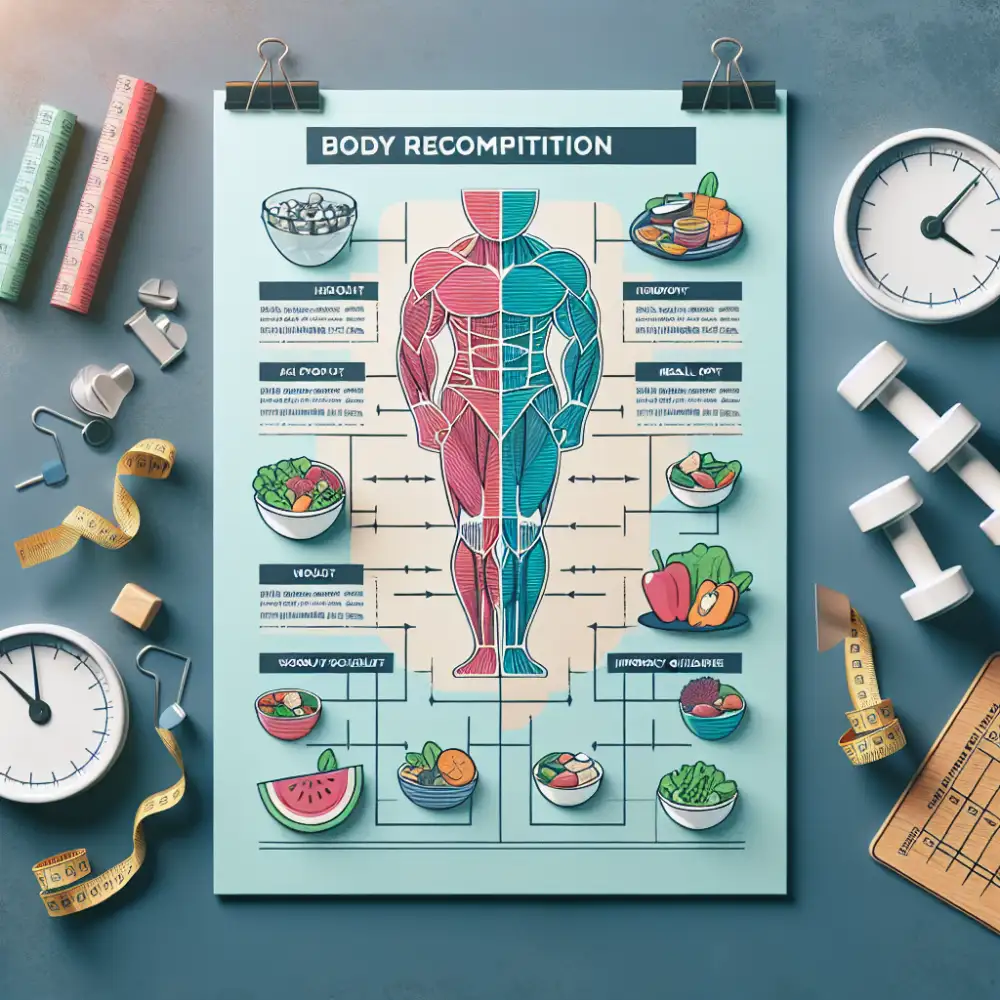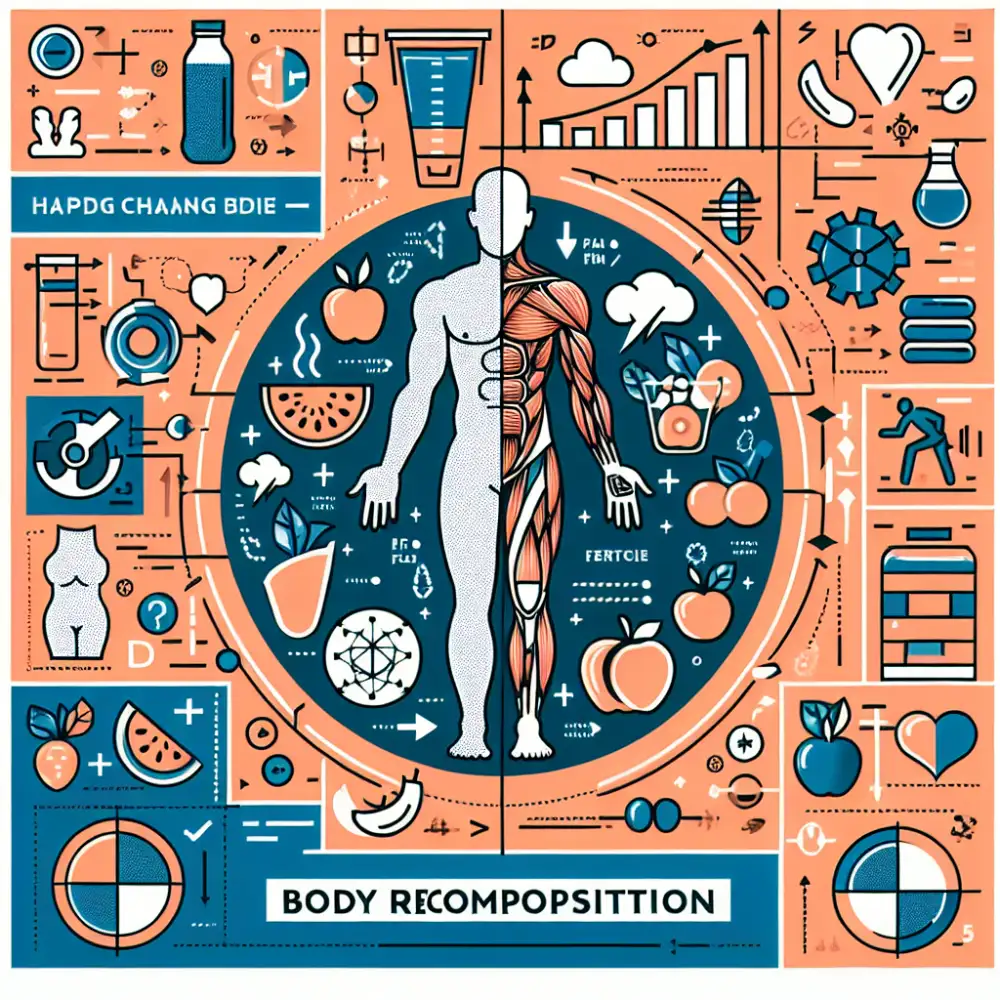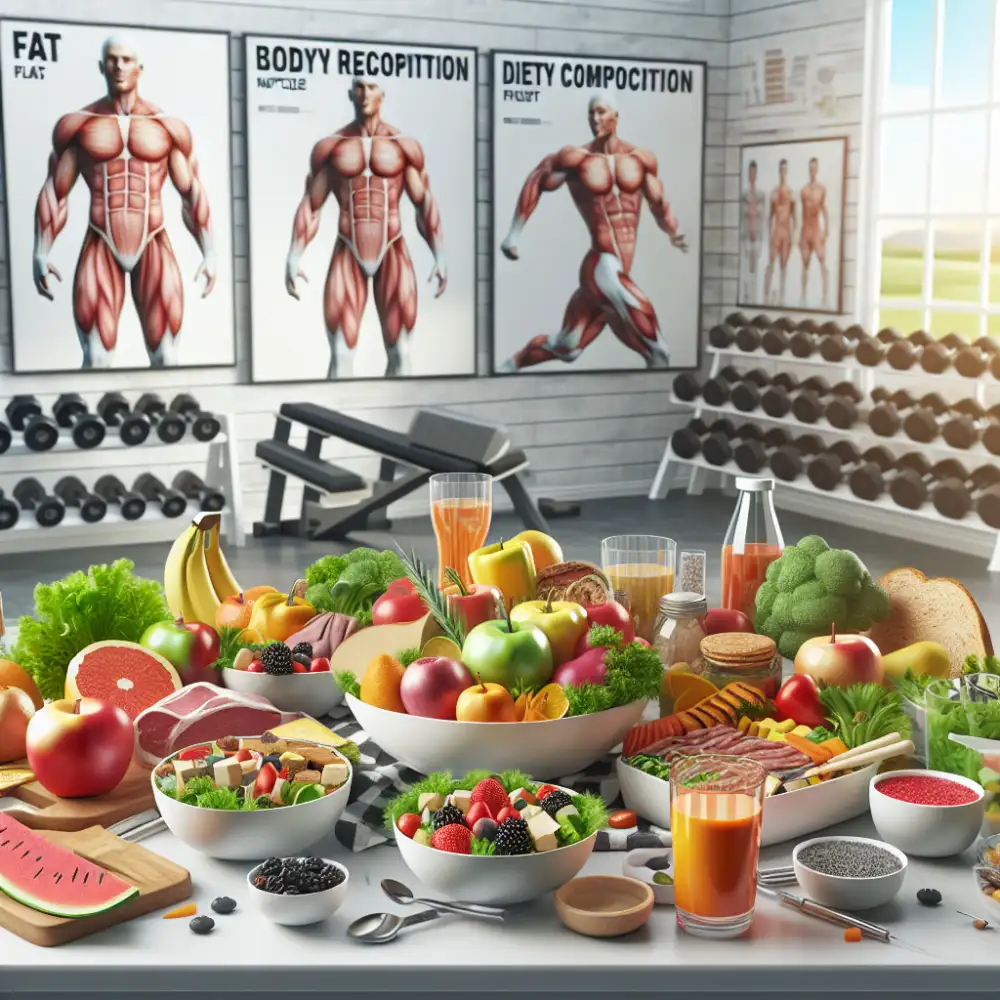The Ultimate Guide to Body Recomposition: Diet Plan for a Shredded Physique

Prioritize Protein Intake
When it comes to body recomposition, protein is your best friend. Think of it as the building block for that lean muscle mass you're working towards. Aim for a higher protein intake than you might be used to, as it helps you maintain muscle mass while you're cutting calories and losing fat. How much protein? A good rule of thumb is around 1.6 to 2.2 grams of protein per kilogram of body weight, or 0.7 to 1 gram per pound.
Don't worry, you don't need to live on protein shakes (though they can be helpful). Incorporate plenty of protein-rich foods into your diet throughout the day. Think lean meats like chicken and fish, Greek yogurt, eggs, tofu, beans, and lentils. Spreading your protein intake throughout the day, rather than having it all in one meal, can further maximize its benefits for muscle growth and maintenance. Remember, consistent protein intake is key to fueling your body recomposition journey.
Manage Calorie Balance
Body recomposition hinges on manipulating your calorie intake to either create a surplus or deficit. Don't worry, it's not as complicated as it sounds!
| Feature | High-Protein Body Recomposition Diet | Carb Cycling Body Recomposition Diet | Intermittent Fasting Body Recomposition Diet |
|---|---|---|---|
| Calorie Intake | Slight calorie deficit or maintenance | Cycles between high, moderate, and low carb days, adjusting calories accordingly | Calorie restriction during specific windows, potentially leading to an overall deficit |
| Macronutrient Ratio | High protein (25-35% of calories), moderate fat (20-30%), moderate carbs (30-45%) | Carb intake varies depending on the day, protein intake remains relatively stable | Macronutrient ratios can vary depending on individual preferences and eating window |
| Exercise Emphasis | Resistance training is crucial for building muscle | Combines resistance training with cardio on high-carb days | Can complement various exercise routines, but timing of meals around workouts may be important |
| Pros | - Promotes muscle growth and preservation - Can aid in fat loss - Provides satiety and helps control hunger |
- May improve insulin sensitivity - Offers flexibility and variety in food choices - Can help break through weight loss plateaus |
- Promotes cellular repair and fat burning processes - Can be easier to follow for some compared to traditional calorie restriction - May improve insulin sensitivity |
| Cons | - Can be restrictive in terms of food choices - May lead to digestive issues if fiber intake is not sufficient - Requires careful tracking of protein intake |
- Requires strict adherence to the cycling schedule - Can be complex to plan and track - May not be suitable for everyone |
- Can lead to hunger and cravings during fasting periods - May disrupt sleep if fasting windows are not strategically timed - Not suitable for individuals with certain medical conditions |
To gain muscle, you need to eat slightly more calories than you burn. This surplus provides your body with the energy to build new muscle tissue. Aim for a modest calorie surplus of around 200-300 calories per day. This means if you typically burn 2000 calories daily, aim for 2200-2300.

Conversely, to lose fat, you need to consume slightly fewer calories than you burn. This deficit forces your body to tap into stored fat reserves for energy. A safe and sustainable calorie deficit for fat loss is around 300-500 calories per day. So, if you usually burn 2000 calories, aim for 1500-1700.
Tracking your calorie intake is crucial for successful body recomposition. Use a food journal, app, or online calculator to monitor your daily calorie consumption. Be diligent in recording everything you eat and drink, as even small discrepancies can add up over time.
Remember, calorie balance is not a one-size-fits-all concept. Your individual needs will depend on factors like your activity level, metabolism, and body composition goals. It's always a good idea to consult with a registered dietitian or certified nutritionist to determine the optimal calorie range for your specific needs.
Resistance Training is Key
While nailing your nutrition is essential for body recomposition, resistance training is the other side of the coin. You see, when you're eating at a calorie deficit or maintenance (necessary for fat loss), your body needs a reason to hold onto muscle mass. Enter resistance training.
Lifting weights provides the stimulus your muscles need to grow and adapt. It tells your body, "Hey, I need these muscles, so don't even think about breaking them down for energy!" This is crucial because the more muscle you have, the more calories you burn at rest, making your body a more efficient fat-burning machine.
But it's not just about lifting heavy things. You need to focus on progressive overload, which means constantly challenging your muscles by increasing weight, reps, or sets over time. This ensures you're continuously pushing your body and forcing it to adapt and build new muscle tissue.
Don't be afraid to hit the weights section. Start with bodyweight exercises or lighter weights and gradually increase the intensity as you get stronger. Remember, consistency is key! Aim for 2-4 strength training sessions per week, targeting all major muscle groups.

Incorporate Cardio Workouts
Cardio is your friend when it comes to body recomposition. It not only torches calories for fat loss but also strengthens your heart and improves your overall fitness. The key is to find the right balance and type of cardio that complements your weight training. Aim for at least 150 minutes of moderate-intensity cardio or 75 minutes of vigorous-intensity cardio per week. You can spread this out over several days. Moderate-intensity cardio includes brisk walking, cycling, or swimming at a pace where you can still hold a conversation. Vigorous-intensity cardio means you're working harder, breathing faster, and sweating more, like running, HIIT workouts, or jumping rope. Listen to your body and adjust the intensity and duration of your cardio sessions as needed. Remember, consistency is key when it comes to seeing results.
Prioritize Sleep and Recovery
When you're aiming to change your body composition, focusing on building muscle and losing fat, prioritizing sleep and recovery becomes just as crucial as your workouts and nutrition. Think of it this way: your body isn't building muscle while you're lifting weights, it's actually recovering and rebuilding during the hours after your workout, especially when you're sleeping.
During deep sleep, your body releases growth hormone, a key player in muscle growth and repair. It also helps regulate your metabolism, which is essential for fat loss. When you're sleep-deprived, your body produces more of the stress hormone cortisol, which can actually lead to muscle breakdown and increased fat storage, particularly around your midsection. Aim for 7-9 hours of quality sleep each night to support your body recomposition goals.
In addition to sleep, prioritize rest and recovery throughout your week. Don't underestimate the importance of rest days. These are not days for being completely inactive, but rather focus on active recovery like light walks, stretching, or gentle yoga. This helps improve blood flow, reduce muscle soreness, and prepare you for your next workout. Listen to your body and don't hesitate to take an extra rest day when needed. Remember, consistency over time is key, and pushing through exhaustion can lead to setbacks and injuries.
Manage Stress Levels
Embarking on a body recomposition journey can be both exciting and challenging. It's not just about changing your physique; it's about transforming your lifestyle. This process can sometimes lead to stress, which can impact your progress. Here's how to keep stress in check:
Prioritize sleep. Aim for 7-9 hours of quality sleep each night. Sleep deprivation can disrupt hormone balance, potentially leading to increased cortisol levels (a stress hormone) and hindering muscle growth.


Manage your expectations. Body recomposition is a gradual process. Avoid comparing yourself to others and celebrate your own small victories along the way. Remember, consistency and patience are key.
Incorporate stress-reducing activities. Explore activities like yoga, meditation, or spending time in nature. These practices can help lower cortisol levels, improve sleep, and promote overall well-being.
Don't neglect your social life. Connecting with friends and family can provide emotional support and help you de-stress. Sharing your journey with others can offer a sense of accountability and encouragement.
Fuel your body properly. Following a balanced diet is crucial for both physical and mental health. Ensure you're consuming enough calories and nutrients to support your workouts and overall well-being.
Listen to your body. Don't be afraid to take rest days when needed. Overtraining can lead to fatigue, increased stress, and potential injury.
Stay Hydrated
Staying hydrated is just as crucial as your nutrition when aiming to transform your body composition. Think of water as your body's internal lubricant, ensuring everything runs smoothly, especially during a recomp.
Here's why: water plays a vital role in nutrient absorption, helping your body utilize the protein you're consuming to build muscle. It also aids in waste removal, flushing out toxins that can hinder your progress. Ever feel sluggish during a workout? Dehydration could be the culprit. Water helps regulate body temperature, preventing overheating and fatigue, allowing you to push harder and longer.
Don't wait until you're thirsty – that's a sign you're already slightly dehydrated. Aim for consistent water intake throughout the day. Carry a reusable water bottle with you as a visual reminder. How much water you need varies, but a good starting point is half your body weight in ounces. For example, if you weigh 150 pounds, aim for 75 ounces of water daily. Adjust based on your activity level and climate. Remember, consistent hydration is key for optimal body recomposition results.
Listen to Your Body
One of the most crucial aspects of a successful body recomposition diet is learning to listen to your body. This means paying attention to hunger cues, fullness signals, and energy levels. Don't force yourself to follow a rigid eating schedule if you're not truly hungry. Similarly, don't ignore your body's signals telling you it's full, even if you haven't finished your meal.

Tuning into your body's energy levels is also vital. If you're feeling sluggish and drained, it might be a sign you need to adjust your calorie intake or macronutrient ratios. Conversely, if you're consistently energized and performing well in your workouts, it's a good indicator that your diet is supporting your body's needs.
Remember, body recomposition is a journey, not a race. There will be days when you feel amazing and days when you feel less motivated. Listen to your body, adjust your plan as needed, and prioritize consistency over perfection.
Consult a Healthcare Professional
It's crucial to talk to your doctor or a registered dietitian before making significant dietary changes, especially if you have any underlying health conditions. They can help you determine if a body recomposition diet plan is appropriate for you based on your individual needs and goals. They can also provide personalized guidance on calorie and macro targets, safe exercise routines, and potential nutrient deficiencies to watch out for. Remember, what works for one person may not work for another, and professional guidance can make all the difference in achieving your desired results safely and effectively. Don't hesitate to reach out to a healthcare professional to ensure you're on the right track.
Track Progress and Adjust
Consistency is key, but that doesn’t mean your journey will be linear. Monitor your progress closely and be ready to adjust your plan as needed. This isn’t about punishing yourself for slip-ups, but about understanding what your body responds to best.
How do you track progress? Regularly weigh yourself, take progress photos, and monitor your body fat percentage. More importantly, pay attention to how your clothes fit and how you feel. Are you gaining strength? Do you have more energy? These are all positive signs that you’re on the right track.
Don’t be afraid to adjust your calorie intake or macros based on your progress. If you hit a plateau, try incorporating more intense workouts, experimenting with different macro ratios, or slightly reducing your calorie intake. Remember, body recomposition is a marathon, not a sprint. Be patient, stay consistent, and enjoy the journey to a healthier, stronger you.
Published: 28. 06. 2024
Category: Health



